Granma 299
The Truth About Batista

The Truth About Batista
He was a pawn who implemented the policies for the region, advised by his mentors. His masters provided him with solid material support and military advice.
Translated and edited by Walter Lippmann for CubaNews.
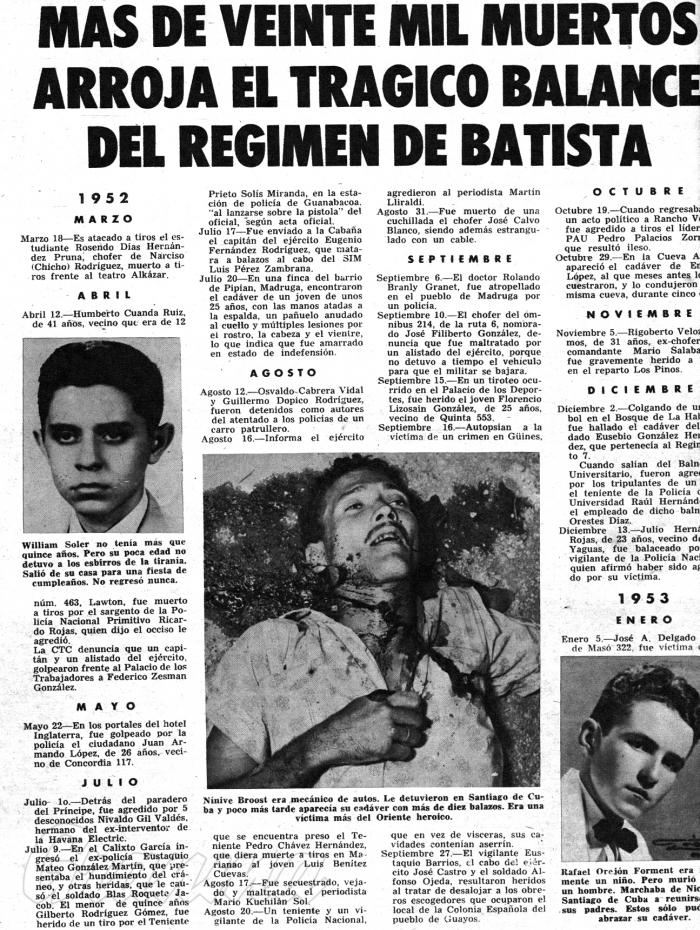
Page from Bohemia magazine, January 11, 1959 issue. Granma Archive
Lie, lie and lie some more. This is the line of the anti-Cuban media in South Florida, when dealing with the subject of the Island, in terms of current affairs, but also of the past.
For years, television networks, radio stations, websites and newspapers based there have, among their discursive guidelines -although the matrix has intensified notably during the last few weeks-, the vindication of the bloodthirsty tyrant Fulgencio Batista.
Throughout January and February 2022, there was a congestion of articles, comments and interviews with relatives of the dictator or alleged experts on his “legacy”. What has been said in such spaces about this terrifying character in Cuba’s history is so absurd and mendacious that it borders on delirium.
Any saint’s life would be dwarfed by such an avalanche of falsehoods aimed at ennobling the abject figure. But to really know who Fulgencio Batista was, it is not even necessary to go to “the history written by the communists”. The truth can even be found in the Western media, books and statements by high-ranking officials in Washington.
In 1952, this gentleman established the bloodiest and most corrupt dictatorship ever known in Cuba, with only the precedent of Gerardo Machado’s satrapy in terms of a criminal record.
Known for his previous work at the helm of the country, both because of his past as a coup leader and his pro-Washington fervors -demonstrated since his alliance with Ambassador Sumner Welles in 1933-, the 1952 uprising had the full backing of the U.S. Government.
He was a pawn who implemented the policies for the region, advised by his mentors. His masters gave him solid material backing and military advice, similar to what they did, years later, with the Pinochet misrule in Chile, after the coup against Salvador Allende.
U.S. investments would reach one billion dollars in Cuba throughout his term of office. The visits of then Vice President Richard Nixon and Allan Dulles, director of the CIA, in 1955, served to strengthen the empire’s economic and ideological programs on the island.
Dulles told the tyrant of his government’s concern about communist activity in Cuba, in response to which the dictator inaugurated, in a few weeks, the Bureau for the Repression of Communist Activities (the dreaded BRAC).
The “creature”, together with the no less dreadful Military Intelligence Service (SIM), the National Police and the Army, turned the country into a police state, in whose vortex people lived in permanent anxiety and where political disaffection was punished with death, without half measures.
Meanwhile, the U.S. mafia turned the night and gambling business into another empire in Cuba, called “the brothel of America”, a subject on which valuable research has been published.
Everyone in the north, bandits included, Batista had a free bar here. Thus, he sponsored the great assassins of Latin American history (Conrado Carratalá, Pilar García, the Salas Cañizares brothers -Rafael, Juan and José María- and Esteban Ventura Novo) and cohorts of criminals to defend his sinister political structure.
They were “men of base instincts, born criminals, beasts carrying all the ancestral atavisms dressed in human form”, to put it in Fidel’s words, who put the nation on edge and, especially, its youth, who died with their eyes gouged out, without nails, their testicles burst or raped, in barracks, ditches, wastelands, rivers, seas.
In his reign of “blood and plunder” -terms used by journalist Enrique de la Osa-, corruption surpassed all historical standards of a nation already expert in the matter. Batista, by himself, raised his presidential salary from 26,400 to 144,000 dollars, even higher than that of U.S. President Truman, whose salary was around 100,000 dollars.
However, a large part of the Cuban population was unemployed, while the majority of the peasants lived in huts with guano roofs [guano is the excrement of seabirds and bats] and dirt floors, with no sanitary services or running water. Meanwhile, 90% had no electricity.
As the French professor, Salim Lamrani states in his essay 50 truths about the Fulgencio Batista dictatorship in Cuba, the English economist Dudley Seers wrote that the situation in 1958 was intolerable: “in the countryside, social conditions were appalling. About a third of the nation lived in squalor (…) living in barracks, usually without electricity or latrines, victims of parasitic diseases and did not benefit from a health service.
“They were denied education (their children went to school for a year at the most). The situation of the precarious, installed in temporary shacks on collective lands, was particularly difficult (…). A significant proportion of the urban population was also very miserable”.
Arthur M. Schlesinger, Jr., personal advisor to President John F. Kennedy, wrote: “I loved Havana and was horrified by the way this lovely city was unfortunately transformed into a great casino and whorehouse for American businessmen (…). One wondered how Cubans – seeing this reality – could regard the U.S. in any other way than with hatred”.
This was the Cuba of misery, blood and terror imposed by Batista, the “beatific” president they now want to sell us from Florida. Just the thought of such a past redoubles our strength in the struggle to never go back to such a desolate scenario.
Ukraine and the spark of Donbass

Ukraine and the spark of Donbass
In a tweet, the member of the Political Bureau and Cuban Foreign Minister, Bruno Rodríguez Parrilla, wrote: “We strongly reject the propagandistic and communicational hysteria unleashed by the U.S. government against Russia and we firmly oppose the expansion of NATO to the borders of that brother country”.
Translated and edited by Walter Lippmann for CubaNews.

Russia estimates that more than 40 000 refugees from Donbas are already on its territory. Photo: Sputnik
The last week – that of the Russian “invasion” of Ukraine, fabricated by Washington – ended, and with it even the Russian military maneuvers, scheduled in advance, began the timeline for the return home of those involved.
Both the President of the United States, Joe Biden, as well as the highest exponents of NATO and some European rulers or subordinates were left wanting the shots to ring out and insisted on new lies on the same subject, but now more towards the inside of Ukraine than in the foreign environment.
The Kyiv government, used as “bait” for Russia to “take the bait” of the West and provoke a war, seems to be disappointed by so many lies and manipulation of those who have promised it NATO membership and the guarantee of its security in the face of a possible reaction from Moscow.
However, with these actions, the only thing they have caused Ukraine is a substantial economic loss that already exceeds $3 billion, without counting the bills that will be passed on later for the “aid” in weapons of all kinds that they are providing it with. But where are the shots and the supposed casualties caused by the Russian invasion? Where did the tanks and artillery that Washington announced would reach Kyiv come in.
Then they remembered a key piece in this puzzle: the separatist republics of Donbass with their territories of Donetsk (DPR) and Lugansk (LPR), in Ukraine, became, overnight, the spark of a new provocation against Moscow.
Kyiv, with its army, is staging a montage that cannot be sustained, but which already this weekend left some civilians dead and more than 40,000 people of Russian origin were forced to cross the border and take refuge in the Russian region of Rostov.
In view of the heated warlike mood, both Russia and Belarus, which had already ended their joint military maneuvers, have decided to prolong them. Belarusian Defense Minister Viktor Khrenin described the current scenario as “a strong smell of gunpowder” in the region, with the possibility of “Europe being pushed into a war”, as several neighboring countries are accumulating more advanced weapons, according to RT.
He also reiterated that the goal of the Russian and Belarusian maneuvers remains the same: “to ensure an adequate response and de-escalation of the enemies’ military preparations.”
In the meantime, the spark in Donbas may become, with the help of the West and the mainstream press at its service, a detonator that will make what Russia and the international community want to avoid – a war – a reality.
Cuba: zero tolerance for drug trafficking

Cuba: zero tolerance for global drug trafficking threat
Permanent vigilance and timely response by specialized forces made it possible to dismantle a criminal network organized by Cubans from Mexico.
Translated and edited by Walter Lippmann for CubaNews.
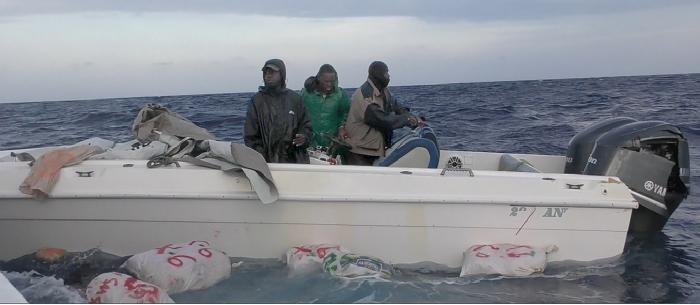
While the world is plunged into the devastating pandemic of COVID-19, hundreds of new and increasingly dangerous synthetic drugs are invading every corner of the planet, adding to the abuse of marijuana, cocaine and heroin, which affect almost 300 million people.
The main market on the planet, the United States, has the highest number of deaths from drug overdoses in its history, with more than 100,000 deaths between April 2020 and the same month in 2021, most of them due to the so-called opioid epidemic, which increased lethality by 28.5%.
Illicit drug trafficking and consumption continue to be a serious global phenomenon that threatens international security and from which no country can escape, due to the complex and sophisticated networks of the lucrative drug trafficking business (more than $600 billion in annual profits), the omnipresence of the mafias, the use of maritime and air corridors, ways of operating and inserting themselves into the dynamics of world trade, and allying with other forms of international organized crime.
The effects of international trafficking continued to impact Cuba in 2021, from the complex regional framework, its incidence in the Caribbean, the existence of routes close to our territory and the arrival of packages dragged by sea currents (recalos), which represented the largest volume of seized drugs and a potential danger for the articulation of internal trafficking. Attempts to smuggle or introduce drugs across maritime and air borders were also confronted; marijuana crops were dismantled and internal trafficking activities were neutralized.
The persistence and intentionality of Cuban and foreign emigrants to organize drug operations with the support of Cuban citizens was noted, for which they rearranged and diversified their actions, using unaccompanied loads, postal shipments and the use of speedboats.
One of the most dangerous trends of the year was the combination of human trafficking operations with attempts to smuggle drugs into the country using speedboats and other vessels, in line with the changes generated by international crime.
Likewise, 18 sightings of suspicious means that violated the airspace and eight vessels in alleged illicit operations were detected, all of which evidences an increase in the threats in the maritime and air environment of the Cuban archipelago.
These challenges demanded a redoubling of surveillance, persecution and coordinated confrontation between the bodies of the Ministry of the Interior (Minint), the General Customs of the Republic, other participating agencies and the people.
A YEAR OF INTENSE CONFRONTATION
According to information provided by MININT, as a result of the confrontation in 2021, Cuba seized a total of 4 162.23 kilograms (kg) of drugs, mostly marijuana; captured five naval means involved in drug trafficking operations and confiscated goods and sums of money due to these illicit activities.
The largest amount of drugs – it was revealed – was seized in the 295 drug seizures, higher than the 153 in 2020, and with a total of 2,338.64 kg of drugs seized in those events. Other high volumes were captured during the seizure of the aforementioned vessels.
As for the air border, 21 international drug trafficking operations were neutralized at the José Martí International Airport in the capital, in which 67.59 kg of these substances were seized and 41 people, including foreigners and nationals, were arrested.
In the fight against the cultivation of marijuana, 97 plantations were discovered, in which 32,868 plants and 48,521 seeds were seized. Meanwhile, 121 acts of internal trafficking were neutralized, with 165.63 kg of marijuana.
CHECKMATE AT SEA
The permanent surveillance and timely response of the specialized forces made it possible to dismantle a criminal network organized by Cubans from Mexico, with a support base in Panama, Costa Rica and Cuba, with the intention of smuggling marijuana, cocaine and methamphetamines, using passengers, cargo and speedboats in combined human and drug trafficking operations. As a result of this operation, 26 individuals were arrested, 303.37 kg of drugs were seized, and a speedboat was captured.
In addition, two other vessels linked to combined human and drug trafficking operations directed to Cuba from Mexico, the U.S. and Jamaica were neutralized and seized, in which significant amounts of marijuana and synthetic cannabinoids were seized.
In addition, two other speedboats were captured with six Bahamian crew members on board, who were seized with 1,291.82 kg of marijuana, and who were linked to operations not directed to Cuba.
The results of 2021 confirm the political will of the Cuban government to continuously strengthen the fight against the serious global scourge of drug trafficking and the prevention of drug abuse, and to prevent the use of airspace and territorial sea by international drug traffickers, with their lethal cargo destined for the main consumer markets, or to try to penetrate the country.
The big swindle

The big swindle
There is a tendency to publish arbitrary and manipulated exchange rates in the media financed from abroad, as well as false information, which has been denied by our media and on institutional sites.
January 26, 2022 23:01:05 PM
Translated and edited by Walter Lippmann for CubaNews.
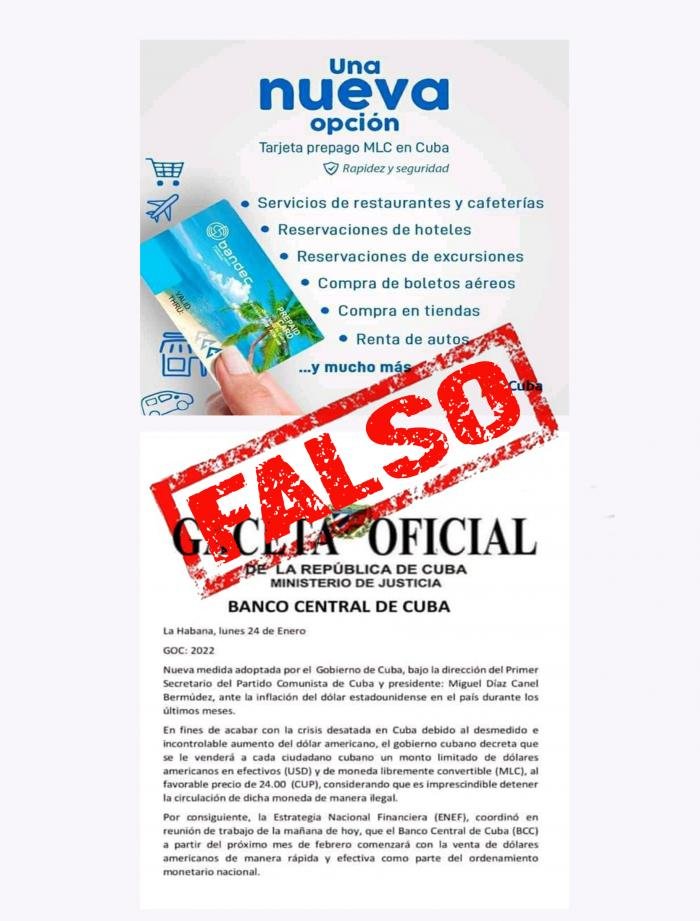
Photo: Screenshot
Could someone tell us how many daily transactions are made in Cuba to buy pesos with MLC cards? Of course not, it is CUP data that banks keep secret. Maybe tell us the number of people who, in parks, living rooms of their homes, or wherever they consider appropriate, exchange CUP in cash for dollars? Of course, it is not possible to know this either.
And then, how do you believe those media that claim to know the exchange rate of the dollar, the euro, or the MLC in the street? Are these gentlemen hackers capable of spying on the phones of Cubans? Are they fortune tellers or telepaths? Did they buy a crystal ball that tells them?
Do you know what a self-fulfilling prophecy is? Let me explain: it is a prediction that, once made, is in itself the cause of its coming true. I mean, inflation certainly exists, the exchange rate on the street is different from the official one, but it is not the one that certain sites offer as true either. It becomes real thanks to the fact that many people believe them and take them as such.
How do these gentlemen arrive at the number: they simply place it with their hand. They say that they calculate it based on trends in certain WhatsApp groups, which in turn are taken from Revolico groups, which in turn… That is, Pancho says, Maria says, Pedro says, Songo says: the one who gave it to Borondongo, the one who gave it to Bernabé.
It turns out that our economy grew by 2% in 2021.Since November, the borders were opened, tourism started, the pandemic fell to bearable levels, the so-called mules return, and as a consequence of this, which means greater availability of foreign currency and products in the street, the exchange rate does not decrease, as it is to be expected, but rather it becomes violently more expensive.
How there are people getting rich thanks to such a trick. The next move was already a foregone conclusion. For a week the supposed exchange rates were manipulated until they reached spectacular numbers, and then, suddenly, by other means, the lie was circulated -by falsifying the official Gazette- that soon our banks would begin to sell a limited amount of foreign currency to the population.
Can anyone still not see the scam? It is easy to illustrate. Since I am confident that a significant number of people trust me, I say that the exchange rate is, let us say, at 105. Then, given a supposed government announcement, I claim that the rate is going down, and so I take the opportunity to buy dollars at a much lower price. With a simple deception operation, bingo, I fill my pockets. I will never lose because, if this trap does not work, I can always buy more in local currency, where, paradoxically, prices maintain a certain stability, and some even decrease.
I uploaded a post on Facebook with this topic -which was shared in several groups, and also on other social networks-, and there I said: “Now academics and other “experts” will come to justify and show the existence of these alleged rates as a scientific truth”. And I was not wrong. Someone immediately came out to refute me, and to say that a certain colleague of theirs, with a copious curriculum vitae, received an award for having invented a novel method to calculate exchange rates based on Revolico’s sales.
Really, more than 200 years after Gauss, Bayes or Laplace? And what was the name of the thesis? A magic formula for the calculation of prices, based on a population sample of speculators on Revolico? Surely the calculation of this “scientist” would be accompanied by a warning letterhead: “Estimates, I owe you the size and segmentation of the sample, variance and standard deviation, confidence intervals and other elements of seriousness and predictive good faith, because I really do not know the definitive prices agreed “privately”, nor how many products the speculators sold or if they ever sold any”.
We have every genius…! But let’s not stop at the idea that this hoax is intended to obtain illegal profits; behind it lie more sinister intentions. For example, in Venezuela, they used the same modus operandi to destroy the exchange value of the bolivar. They created a site called Dolar Today, based in the United States, which manipulated the rates upwards every day. Thus, together with other economic blockade measures, they succeeded in inducing galloping inflation in that country. From morning to afternoon, in just three or four hours, prices rose extraordinarily: something impossible to explain with sound logic.
Of course, conditions in Venezuela are different from those in Cuba: 95% of the retail trade there -as well as the foreign trade that feeds it- is in private hands. It is not surprising then that we have seen such “geniuses” many times trying to show the “advantages” of privatizing foreign trade for our economy. This is the strategic link they need to change.
In any case, these are illegal practices that generate uncertainty and violate international norms; but respect for legality has never been a virtue that accompanies U.S. governments when they insist on destroying countries that do not bow to their designs.
Have you ever wondered who finances those sites that supposedly inform you of how the MLC is doing today? Do you believe in the goodness of the same people who blockade us and prevent a father from sending remittances to his children, or a son to his mother, from their territory?
Certainly, our country is going through difficult times. To overcome them and reactivate the economy, it is necessary to control the pandemic, and in this -thanks to our vaccines created by true scientists- we have taken solid steps forward.
There is no other solution than to generate goods and services with our own efforts: something that can be achieved with dedication and responsibility in all areas.
IN CONTEXT
There is a tendency to publish arbitrary and manipulated exchange rates in the media financed from abroad, as well as false information, which has been denied by our media and in institutional sites.
It is noted that they intend to establish the same logic of the so-called Dolar Today in Venezuela, inducing an exchange rate that generates an inflationary stampede, by involving part of the commerce and the private sector, which take these exchange rates as a reference.
In Europe there are also antecedents of this practice. The date of September 16, 1992 is known as Black Wednesday, due to the collapse of the pound sterling, which became one of the main reasons why the United Kingdom was unable to adopt the euro. The event ultimately forced Britain to exit the European Exchange Rate Mechanism. The crash of the pound created immense wealth for investors such as George Soros. It also caused tremendous turmoil in Britain’s political landscape. The reason is that they were spending taxpayers’ money in an attempt to keep the pound afloat.
In the case of Cuba, they are also looking for a way to irritate and capitalize on the popular displeasure caused by inflation, in the midst of a scenario of shortages also motivated by the impact of the persecution of the blockade and the crisis derived from the pandemic, in order to generate scenarios of destabilization.
Millions moved to destabilize Cuba

This is how millions are moved to destabilize Cuba
We reproduce the long list that the NED published on February 23, 2021, on its website, detailing the NGOs and foundations that received money to intervene in Cuba during 2020
Author: Granma | internet@granma.cu
January 16, 2022 20:01:36
Translated by Walter Lippmann for CubaNews.
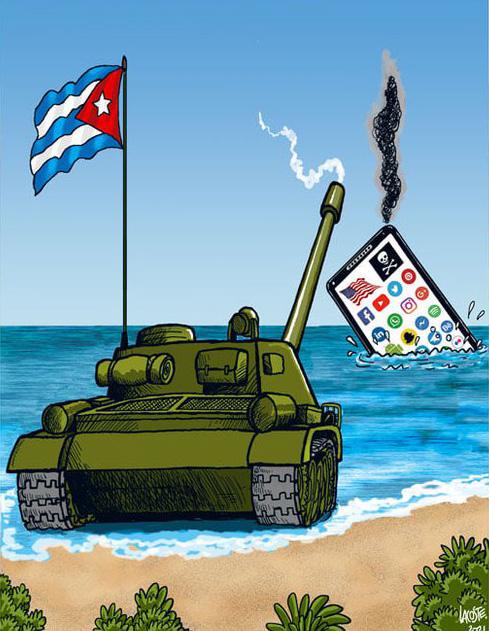
Graphic: Lacoste
In 1983, Republican President Ronald Reagan created the National Endowment for Democracy, known by its acronym in English as NED (National Endowment for Democracy). Since its inception, this organization, together with the United States Agency for International Development (USAID), has functioned as one of the economic arms of the interventionist policy of the United States Government, financing non-governmental organizations (NGOs) and foundations, that are disguised with names of very laudable values such as democracy or freedom, but that seek the change of governments that do not subordinate themselves to Washington’s policies.
These interventionist policies have been developed in many countries of the world, especially in those that are located in what the United States considers its backyard: Latin America and the Caribbean.
As detailed on the NED’s own website, in 2020, the National Endowment for Democracy’s LAC program provided critical support to supposedly promote democracy in countries under what they consider to be the most authoritarian regimes: Cuba, Nicaragua, and Venezuela. In his opinion, two countries in transition, Ecuador and Bolivia, offered important opportunities to reverse previous “authoritarian” legislation on freedom of expression and judicial independence and to encourage citizen participation in electoral processes.
They report expanding what they see as anti-corruption, digital media, and human rights programs, just as the NED reaffirmed commitments to the largest countries in the region: Brazil and Mexico, which for them currently face threats from right-wing populist governments. and left, respectively.
As can be seen, the organization calls Cuba, Nicaragua and Venezuela “more authoritarian regimes”, countries that were openly attacked through the network of foundations and NGOs that this entity has, and defamed by the media. of communication that are also financed through these organizations or other similar ones.
The NED website also reports that, on November 30, 2018, a meeting was held in which the Democratic senator, Robert “Bob” Menéndez, and the Republican member of the House of Representatives, Ileana Ros-Lehtinen, participated. , two well-known activists against popular processes in the region and with links to the most reactionary sectors of Cuban emigration based in Miami.
Along with them, the president of the NED, Carl Gershman, and the administrator of the USAID, Amb. Mark Green, with the aim of promoting alleged leaders in Cuba, Nicaragua and Venezuela.
Gershman took the opportunity to thank Congresswoman Ros-Lehtinen for her unwavering support for the work of “democratic” activists around the world, presenting her with a framed print of the Goddess of Democracy, built in China’s Tiananmen Square, nearly 30 years ago.
Later, NED Senior Director for Latin America and the Caribbean, Miriam Kornblith, participated in a panel with activists from Venezuela and Cuba. Then it is added that “this event brought together US development agencies and legislators with “democratic leaders” from Cuba, Nicaragua and Venezuela.”
LOOK AT CUBA
Since the triumph of the Cuban Revolution in 1959, the United States has sought by all means to force a change of government on the Island. The criminal economic, commercial and financial blockade that Washington illegally and unilaterally maintains against Cuba, and that has been rejected by the vast majority of the international community in 29 votes in the United Nations Organization (UN) is, without a doubt, the most concrete example of this systematic aggression that the US Government maintains against our people.
The promoters of the blockade have confessed on more than one occasion that this series of measures is intended to suffocate the Cuban people, cause chaos and thus generate a change of government and political system.
During the years of the pandemic, 2020 and 2021, the US administration (first under the leadership of Donald Trump and now under Joe Biden) deepened the blockade with new measures. The entry of medicines, respirators, fuel and economic resources to face the crisis caused by covid-19 was prevented. In this framework, protests were fomented to destabilize the Government and thus try to give the Island the final blow (a new failed attempt that generated discomfort and suffering in the Cuban people, but that did not succeed in breaking it).
In the chapter dedicated to Cuba on the NED’s own website, the list of resources that, during the year 2020, that organization has allocated to promote destabilization is shown.
According to data released by the NED, during that year more than five million dollars (5,077,788) were invested for this purpose, to which must be added the resources provided to NGOs and foundations that do not appear in the Cuba chapter. , but that act against the Island and, also, add the funds channeled through USAID and other similar organizations.
We reproduce the long list that the NED published on February 23, 2021, on its website, detailing the NGOs and foundations that received money to intervene in Cuba during 2020 (with figures ranging from 20,000 to 650,000). Dollars).
- International Platform for Human Rights in Cuba (for EU-Cuba relations): $87,253
- Cubalex (for complaints of human rights violations): $150,000
- Fundación Cartel Urbano (to turn hip hop artists into leaders): $110,000
- Democratic National Institute for International Affairs (to reduce gender-based violence): $500,000
- Freedom of information (for new ways of reporting): $80,000
- Publisher Hypermedia Inc.: $93,941
- Latin American Center for Nonviolence: $48,597
- Institute of Communication and Development: $79,300
- Electoral Transparency: $74,945
- Research and Innovation Factual ac (for regional media networks): $74,000
- Cuban Human Rights Observatory: $150,000
- Freedom of Information (for sports coverage): $50,000
- Agora Cuba Inc. (for information): $75,860
- Cuban Daily Association: $215,000
- Freedom of information: $72,000
- Foundation for Human Rights in Cuba, Inc.: $126,000
- Cuban Institute for Freedom of Expression and the Press: $146,360
- Freedom of information (news media): $56,500
- Democratic Culture (for the arts): $49,106
- Freedom of information (attention to journalists and bloggers): $33,180
- Cuban Democratic Directorate (civil society): $650,000
- Democratic ideas and values (for marginal populations): $23,500
- Freedom of information (for independent media): $75,000
- Accountability and Governance: $120,267
- Promotion of the use of data in journalism in Cuba: $91,319
- Government and Political Analysis ac: $115,000
- Asociación Civil Cronos (for innovation in journalism): $80,000
- Freedom of information (social media work): $50,000
- Inter-American Institute of Human Rights: $95,000
- Freedom of Information (Critical Thinking): $99,980
- Center for International Private Enterprise: $309,766
- Press and Society Institute: $70,523
- Public Space Foundation (independent media): $108,000
- People in Need Slovakia (for civil society): $60,000
- Clovek v. tisni, ops (for news outlets): $150,882
- Political Institute for Liberty: $85,000
- Arlenica, Art, Language and Research for Social Change, a Supplement: $11,940
- Center for a Free Cuba (for human rights): $80,000
- Institute for War and Peace Reporting (iwpr): $145,230
- International Group for Corporate Social Responsibility in Cuba (support for independent unions, freelancers, and labor rights): $230,000
- Vista Larga Foundation Corp (for writers and artists): $83,000
- Democratic ideas and values (for intervention in various sectors): $71,339
Source: Diariocontexto.com.ar
January 1959: on the road to Santiago

January 1959:
Cuba’s destiny on the road to Santiago
Five years, five months and five days earlier, the assault on the Guillermon Moncada Barracks in Santiago de Cuba and Carlos Manuel de Cespedes Barracks in Bayamo, on July 26, 1953, had been the attempt to launch a popular insurrection.
Translated and edited by Walter Lippmann for CubaNews.
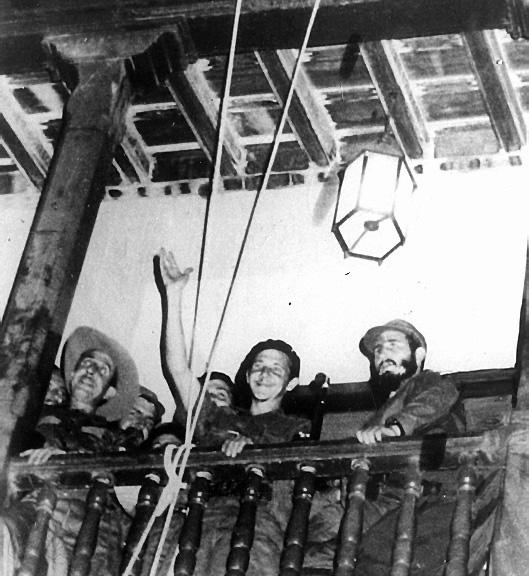
Fidel went to Céspedes Park, the main park in the city, to speak to the compact and euphoric mass gathered there from the balcony of the City Hall and proclaim the triumph of the Revolution on January 1st, 1959. At his side, Commander Raúl Castro Ruz. Photo: Granma Archive
When, on January 1, 1959, Fidel Castro Ruz, at the head of his troops, advanced on Santiago de Cuba and its garrison of some 5,000 soldiers, to begin what would perhaps have been the bloodiest and hardest battle of the anti-Batista insurrection, it was curious and strange to hear on the radio that in the city the people were in the streets with flags of the 26th of July Movement, cheering the rebel leader and celebrating the revolutionary triumph. What were the circumstances that made up such a paradoxical situation? How was the victory finally consummated in the eastern city?
Five years, five months and five days earlier, the assault on the Guillermon Moncada Barracks in Santiago de Cuba and Carlos Manuel de Cespedes Barracks in Bayamo, on July 26, 1953, had been the attempt to launch a popular insurrection that would grow and advance towards Havana until it broke the resistance of the dictatorial regime. The success of the plan rested on the surprise factor and the response of the people to the call to combat. The military importance of the Moncada, together with the symbolism of Santiago de Cuba and the traditions of rebellion of its inhabitants, made the main action take place there, generating the historical merit of having been the place where this last stage of the revolutionary struggle began.
Later, with the landing of the Granma yacht in its political-administrative jurisdiction, today’s Heroic City rose up in arms on November 30, 1956, in what could have been a new insurrectional outbreak that made possible, with other pronouncements of the 26th of July Movement and other forces, the overthrow of the dictatorship. Santiago was once again, despite other actions, the capital symbol of the revolutionary activity of the country. The two most important moments of the struggle against Batista until then had taken place in its urban perimeter and/or jurisdictional space. It was an extraordinary accumulation.
If the immense majority of the nuclei in favor of the violent struggle were betting on the success of a fulminating operation in Havana, in which the joint effort of military conspiracies and armed civilian bodies would provoke a rapid fall of the regime, the July 26th Movement based its efforts on a two-phase strategy, starting with the partial or total control of the province of Oriente, whose center would be the capture of the city of Santiago de Cuba, to expand the revolutionary thrust from there towards the rest of the Island.

Entrance of Commander in Chief Fidel Castro Ruz to Santiago de Cuba, in 1959. At his side Manuel Piñeiro (the one with the beard). Photo: Granma Archive
The strategic importance of the city can be measured by the design and execution of Operation Santiago, the rebel attack for its encirclement and surrender, which, together with the invasion of the west of the Island, was the most important insurgent offensive operation in the final months of 1958.
The battle for Santiago de Cuba, now not by a surprise attack as in 1953 nor by an internal uprising as in 1956, but by the combative approach of guerrilla units, personally led by Commander in Chief Fidel Castro Ruz, had the potential to become the equivalent of the battle of Ayacucho in the independence of South America: decisive in determining the end of the war of liberation. It is also true that the distance from Havana did not necessarily have to be settled, in case of a rebel victory in the city, with the fall of the dictatorship. Once Santiago de Cuba was taken, the regime still had room for maneuver in the theater of operations, especially due to the concurrence of neutralizing maneuvers and foreign intervention.
The devastating guerrilla advance on Santa Clara, halfway to Havana, together with the success of the progressive isolation and encirclement of Santiago de Cuba put the dictator and his acolytes in check. The imminence of a disaster was decisive for the activation or hastening of various attempts to prevent the revolutionary triumph or to achieve its mediatization. Within the military ranks, desertions, accelerated surrenders and conspiratorial proposals increased. Fidel had never been reluctant to the possibility of military conspiracies that would bring the fall of the dictatorship closer with less bloodshed, as long as they did not compromise the fulfillment of the revolutionary program.
In this sense, he sought that the military pronouncements would come about through his incorporation into the rebel forces and not by means of a coup d’état in the nation’s capital.
That is why he agreed to the unconditional collaboration offered by the Chief of Army Operations in the eastern province, Major General Eulogio Cantillo y Porras, on December 28, 1958, when the Batista regime was already tottering and its overthrow seemed a matter of days. The high-ranking officer committed himself to the uprising of the commanders loyal to him, in coordination with the guerrilla forces. This implied a joint pronouncement and the articulation of a common force, which would advance on the enemy positions that did not join the uprising or would not withdraw their hostile attitude. This is how the Commander in Chief explained it:
“The plan was agreed upon in all its details: on the 31st, at 3:00 in the afternoon, the garrison of Santiago de Cuba would revolt. “Immediately several rebel columns would penetrate the city, and the people, with the military and with the rebels, would immediately fraternize, launching a revolutionary proclamation to the country and inviting all the honorable military to join the movement. It was agreed that the tanks in the city would be placed at our disposal, and I personally offered to advance towards the capital with an armored column, preceded by the tanks. The tanks would be delivered to me at 3:00 in the afternoon, not because it was thought that we had to fight, but to foresee in case the movement in Havana failed and there was a need to place our vanguard as close as possible to the capital”.
Cantillo, however, betrayed the agreement. He went to Havana and dedicated himself to organize, in agreement with Batista, a counterrevolutionary conspiracy. To gain time, he sent Fidel a note on December 30 recommending him not to do anything until January 6, because “circumstances had changed a lot in a favorable sense for a national solution”. The rebel chief, sensing the maneuver, replied that the note was a departure from what had been agreed and that hostilities would be broken as of the day and time set for the uprising. Once the attack on Santiago had begun, there would be no other way out than unconditional surrender.

Meeting in El Escandel, where Fidel Castro and Raul Castro meet with a group of officers of the army of the tyranny, on January 1st, 1959, to agree on the surrender of the military square of Santiago de Cuba. Photo: Granma Archive
Faced with the energetic reaction, General Cantillo insisted that he was working on a national solution, not a local one, favorable to the interests of the insurgents, and warned them that they should change the plan and not enter Santiago de Cuba. Just as it had happened in 1898, an upstart ally was trying at the last minute to take power, to hide the popular triumph and to prevent the entry into Santiago of the true freedom fighters.
With reports of the inexorable nature of the rebel offensive in Las Villas and Oriente, the dictator Batista decided to abandon power and flee abroad. After midnight from December 31 to January 1, he executed the plan: he left the country to a Civic-Military Junta, with Major General Eulogio Cantillo as the new Chief of the Army. General Cantillo tried to form a new civilian administration, with the summoning of the “oldest magistrate of the Supreme Court of Justice” as “presidential substitute”, Dr. Carlos Manuel Piedra y Piedra. At the same time, he tried to shore up his authority before the various regular commands of the country, ordered a ceasefire and fraternized with the rebel troops. Forming a civilian government and gaining time with the fraternization of his demoralized military garrisons in the face of the growing guerrilla forces, he believed, would help him consolidate his emerging authority, leaving him in a position to administer the salvation of most of the levers of the old regime.
Then Santiago de Cuba became the heart of the events. Where the insurrection began, the essential issue was resolved: the seizure of power.
Fidel Castro’s response, through Radio Rebelde from Palma Soriano, was immediate and forceful: To denounce and reject the maneuver in the capital as counterrevolutionary, qualifying it as a coup d’état; not to accept cease-fire or fraternization with the military forces; to order the advance of the insurgent forces on the enemy positions, only accepting parliament for unconditional surrender; to order the commanders Camilo Cienfuegos and Ernesto Che Guevara to culminate the military operations in Las Villas and to advance on Havana to take, respectively, the Military City of Columbia and the Fortress of La Cabaña, the two main garrisons of the country; to issue an ultimatum to the military square of Santiago de Cuba to lay down their arms by the end of the afternoon or face a bloody battle, with the historical responsibility for the bloodshed that would ensue; and to call for a general strike until the total fall of the dictatorship and the complete triumph of the Revolution.
The military command of Santiago de Cuba, while complying with the ceasefire and fraternization order, began to send signals of parliament to the rebel leadership. In the afternoon of that day, the military commander of the city, Colonel José Rego Rubido, met with Fidel Castro in the Alto de Villalón, and expressed himself in favor of a joint pronouncement.
After Commander Raul Castro accompanied Rego Rubido to the Moncada Barracks and met with his officers, the latter went up to El Escandel to meet with Fidel, with whom he sealed the agreement that avoided a bloody and exhausting battle for the control of the city, which would have facilitated the possible consolidation of the counterrevolutionary plans in Havana. The eastern officers agreed to “disapprove of the rigged coup in [Camp] Columbia (…) and to support the Cuban Revolution”. The originally agreed uprising of the Santiago garrison took place, now not against the dictator in flight, but against the military junta installed in the capital.
A column of guerrillas and soldiers, with their chiefs at the head, left in a motorized caravan towards Santiago de Cuba, where they entered on the night of January 1st. Fidel headed towards Céspedes Park, the main park of the city, to speak to the compact and euphoric mass gathered there from the balcony of the City Hall, and proclaim the triumph of the Revolution. For the first time, after seven years of dictatorship, the rebel leader communicated directly and massively with a liberated population. Dr. Manuel Urrutia Lleó was sworn in as Provisional President of the Republic, and given his constitutional mandate as Commander in Chief of the Armed Forces, he appointed Fidel Castro as his delegate to the country’s armed institutions. In addition, the rebel leader proclaimed Santiago de Cuba as the new provisional capital of the Republic. This last decision portrays the uncertainty of the circumstance, the danger that in Havana and other cities a counterrevolutionary maneuver would be consolidated. The proclamation was intended to complete a victory in its final phase, in the midst of the ambivalent situation in the capital of the country: the clandestine movement dominates police institutions and strategic buildings, but the main military installations have not yet been occupied by the rebel forces.
These are critical and decisive moments, which will have a favorable outcome in the coming hours with the surrender of several military posts in the country to the guerrilla columns.
It is true that granting Santiago de Cuba the condition of provisional capital had the purpose of materializing the victory, but it also had a symbolic meaning due to the role it had played in the war and throughout the revolutionary history of Cuba.
Empty shelves in the U.S.?

Empty shelves in the U.S.?
The crisis caused by the pandemic is visible even in the country that sustains its abundance at the expense of the world.
Translated and edited by Walter Lippmann for CubaNews.

Empty shelves at a Trader Joe’s supermarket on Spring Street, New York. Photo: CNN
A news report, which seems unusual, is going around the world: CNN claims that there are shortages in supermarkets in the United States. It added that those who run the establishments do not see a solution in the short term, while “disgruntled” shoppers have given “vent to their frustration on social networks”.
Images of empty shelves at stores such as Trader Joe’s, Giant Foods and Publix astound those who still cannot believe the fact that there could be shortages in the land of consumerism.
According to CNN, the causes of the shortages are multiple. The two-year pandemic and the impact of the disease on the lack of personnel for functions such as transportation and logistics, which in turn affects the delivery of products and the restocking of stores.
The National Association of Grocery Stores indicates that many of its members have less than 50% of their workforce. Add to this a continuing shortage of truck drivers and record congestion at the ports.
$2.4 trillion was the value of U.S. imports in 2020, according to Statista. Demand for imported food products grew because it is cheaper to bring them in than to produce them. Consumption patterns that favor frozen and packaged products, which require a powerful industry for permanent supply, also play a role.
Due to the pandemic, import levels have decreased due to the impossibility of guaranteeing the transfer of goods from one country to another, and this affects the supply chain, to which is added the lack of suitable personnel to work, due to the increase of contagions within the country due to the circulation of the Omicron strain.
CNN reported that sick leave accounts for 60% of the total number of infections in the country, in addition to quarantine isolations and distancing protocols.
In addition to this situation, there are adverse weather conditions, with very low temperatures, as well as drought and fires that damaged crops such as wheat, corn, soybeans and coffee.
Today, in addition, the population is panicking about shortages and hoarding, which contributes to a further and rapid decrease in supply.
The increase in empty shelves and prices also poses a danger to Biden and the Democrats, as the Republican narrative exposes the ineffectiveness of the president, who promised, when he took office, to contain COVID-19 and economic dislocation for millions and millions of Americans. The crisis implied by the pandemic is visible even in the country that sustains its abundance at the expense of the world.
Cuba mourns the death Alicia Jrapko

Cuba mourns the death of prominent solidarity activist Alicia Jrapko (+ Video)
Her fundamental work was the struggle for the release of the Five Cuban patriots, unjustly imprisoned for monitoring terrorist activity in the United States against Cuba.
By Nuria Barbosa León
January 12. 2022
Translated and edited by Walter Lippmann for CubaNews.

Upon receiving the Friendship Medal, she reaffirmed her commitment to defend the Cuban Revolution until her last days. Photo: José Manuel Correa
The First Secretary of the Central Committee of the Communist Party of Cuba and President of the Republic, Miguel Díaz-Canel Bermúdez, lamented the death of the tireless Argentine fighter Alicia Jrapko, who devoted her life to fight for justice on behalf of her disappeared comrades. She fought with determination for the return of Elián González, the freedom of the Five and against the blockade.
“Farewell sister,” Diaz-Canel wrote on Twitter. Also, Foreign Minister Bruno Rodríguez Parrilla expressed his heartfelt condolences for the death of the solidarity activist of Argentine origin and resident of Oakland, California, who had to fight against a malignant tumor for more than two years.
#Cuba mourns the death of the tireless Argentine fighter Alicia Jrapko, who devoted her life to fight for justice on behalf of her disappeared comrades. For the return of Elián, the freedom of the Five and against the #Blockade she fought to the end. Farewell sister. pic.twitter.com/yqeJKDFxux
– Miguel Díaz-Canel Bermúdez (@DiazCanelB) January 12, 2022
Granma spoke with her during the solidarity event held in Havana from November 1-3, 2019, where she expressed her faithful activism as coordinator of the International Committee for Peace, Justice and Dignity of the Peoples in the US.
She urged us to “reflect on the fact that today the U.S. is a convulsed society with a decaying system. The government chooses which countries to attack and which to support, depending on their behavior in the face of imperial laws. Today the enemy for them is Venezuela, Cuba, Bolivia, Syria and other nations that have chosen to protect their sovereignty without bowing to imperialist interests.
It was with deep sorrow that we learned of the passing of Alicia Jrapko, a close friend of #Cuba and a devoted defender of just causes. Her support to the struggle for the return of the Five and for the end of the blockade was extraordinary.
Heartfelt condolences to her family and friends. pic.twitter.com/P3xAMZUHvo
– Bruno Rodríguez P (@BrunoRguezP) January 12, 2022
“Cuba has done nothing to the U.S., it has never attacked it, but that government must justify its actions to divert attention so that people cannot reflect on the chaos inside the country. There are many internal problems in terms of unemployment, racism, drugs, murders and other evils. It is a society that shows a face of hatred, xenophobia, instead of messages of love and peace,” argued the woman who headed the International Committee for the Freedom of the Five in the United States.
“I have hope, because in the United States we unite and fight to conquer our rights. Every day we fight and somewhere that society is going to explode,” said Alicia Jrapko, winner of several distinctions, among them the Felix Elmuza Medal awarded by the Union of Journalists of Cuba, the Shield of the city of Holguin and the Friendship Medal granted by the Council of State of the Republic of Cuba, at the proposal of the Cuban Institute of Friendship with the Peoples.
———————————————————————————————————–
Video: Cuban TV prime-time news report on Alicia Jrapko’s passing. No subtitles.
Great actor Sidney Poitier dies at 94

Great actor Sidney Poitier dies at 94
He was the first African-American actor to win an Oscar (Lilies of the Field, 1964), becoming a symbol of Hollywood during the civil rights movement.
Author: International Editor | internacionales@granma.cu
January 8, 2022 11:01:58 AM
Translated and edited by Walter Lippmann for CubaNews.
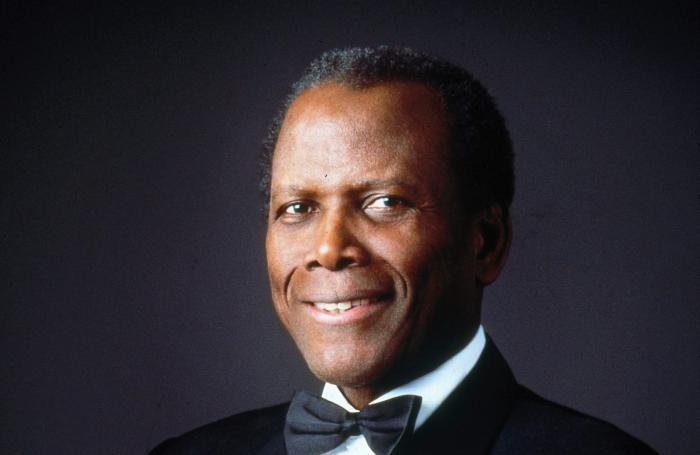
Photo: hipertextual.com
Sidney Poitier, the first African-American actor to win an Oscar (Lilies of the Field, 1964), has died at the age of 94, becoming a symbol of Hollywood during the civil rights movement, a period in which he became the biggest star in the American film industry.
The death of Poitier, who was also a civil rights activist and diplomat, was confirmed by Clint Watson, Press Secretary to the Prime Minister of the Bahamas.
CNN and the German agency Deutsche Welle do not specify details about the death of the legendary actor, born in Miami in 1927 and whose parents were natives of the island of Cat.
In addition to the Oscar, Sidney Poitier received two Oscar nominations, ten Golden Globe nominations, two Emmy Award nominations, six Bafta nominations, eight Golden Laurel Award nominations and one nomination for the Screen Actors Guild Awards.
Following the death of Kirk Douglas in 2020, Sidney Poitier was one of the last survivors of Hollywood’s Golden Age. In addition to an incredibly prolific acting career, between 1997 and 2007 he also served as the Bahamian ambassador to Japan and was on the board of Disney between 1995 and 2003.
He acted in some 50 films, the most important of which include Fugitives, Porgy and Bess, Paris Blues, To Sir, With Love, Lilies of the Field and In the Heat of the Night. In the 1980s and 1990s, his activity slowed down but many will remember him for his performance as Donald Crease in Sneakers, released in 1992 alongside Robert Redford, Dan Aykroyd, Ben Kingsley, Mary McDonnell, River Phoenix and David Strathairn.
He also directed nine films, many of them comedies, in the 1970s and 1980s. Uptown Saturday Night is probably the best-known. From his success, Sidney Poitier directed two more related films that are considered a trilogy: Let’s do it again and A Piece of the Action, all three with Bill Cosby.
Making even the impossible possible

Gema, the most beautiful proof that Cuba can make even the impossible possible
Neither the bars nor the miles of distance prevented the emergence seven years ago of fruit of resistance and loyalty: Gema.
Translated and edited by Walter Lippmann for CubaNews.

She was born “by remote control” says Gerardo Hernandez Nordelo, whom we all know as one, among five, of the Cuban Heroes condemned to the most unjust confinement in the US.
However, neither the bars nor the miles of distance prevented the emergence seven years ago of a fruit of the resistance and loyalty of man: Gema was and is the most beautiful proof of the lineage of the Cuban, the one who can make even the impossible possible.
#GemaDeCuba , the firstborn of Adriana and @GHNordelo5 is indeed the most beautiful proof that even the impossible can be made possible. #CubaViveYCelebra, posted the First Secretary of the Communist Party of Cuba and President of the Republic, Miguel Díaz-Canel Bermúdez, on his Twitter account on the girl’s birthday.
This January 6, the eldest daughter of Gerardo and his wife Adriana Pérez O Connor, turns one year older, and with it come back to memory the past memories: the two life sentences and fifteen years in prison, the hard separation of the couple, and the worst, the absence of children, without the slightest possibility of physical contact to conceive them.
But the strength of faith and hope was greater than the enemies’ determination to punish the Cuban Revolution. During 2013 and 2014 Washington and Havana conducted negotiations that included the possibility of assisted reproduction treatment for Adriana Perez. She had requested it and after several denials, U.S. Senator Patrick Leahy, passing through our land, finally served as mediator and guarantor of the process.
Leahy had visited the island on multiple occasions since the 1990s and is opposed to the U.S. blockade against the island. In 2013 he came with his wife, Marcelle Pomerleau, a nurse by profession. They met with Adriana, who confessed her fear of losing the opportunity to have a baby with her husband.
The response to such a demand was almost immediate, circumventing the laws of the federal prison system that does not allow conjugal visits.
In early 2014, the first insemination attempt was made, but failed. But the second, a couple of months later, was successful. Panama welcomed the initiative and the Cuban government paid for everything.
Thus, the news of Adriana’s pregnancy would bring joy not only to the Cuban family, but also to allies from other parts of the world, who were watching every detail of the pregnancy, until that historic January 6, 2015, when at 8:30 in the morning of the 57th Year of the Revolution, Gema was born in Havana.
A few months earlier, on December 17, 2014, Cuba had jubilantly celebrated the complete return of its five children. With January came one more, weighing only 7.7 lbs, according to science, but in reality, she weighed more, because she carried within her the dream, the sleeplessness, the longing and the resistance of an entire people.
#GemaDeCuba , the firstborn of Adriana and @GHNordelo5 is, indeed, the most beautiful proof that even the impossible can be made possible. #CubaViveYCelebra https://t.co/r8Sxic3TgZ
– Miguel Díaz-Canel Bermúdez (@DiazCanelB) January 7, 2022
Subscribe to Blog via Email
| M | T | W | T | F | S | S |
|---|---|---|---|---|---|---|
| 1 | 2 | 3 | 4 | 5 | 6 | |
| 7 | 8 | 9 | 10 | 11 | 12 | 13 |
| 14 | 15 | 16 | 17 | 18 | 19 | 20 |
| 21 | 22 | 23 | 24 | 25 | 26 | 27 |
| 28 | 29 | 30 | ||||

You must be logged in to post a comment.